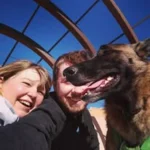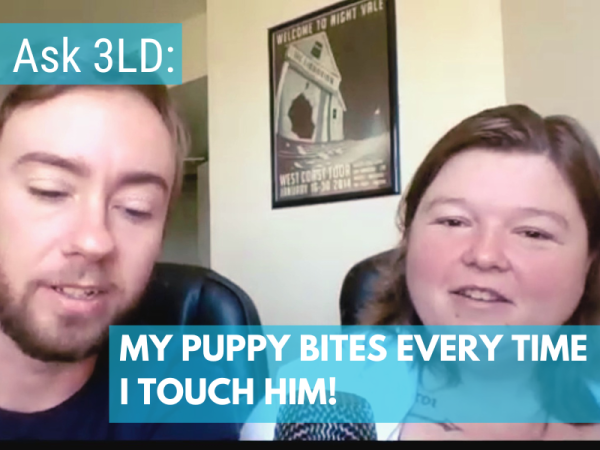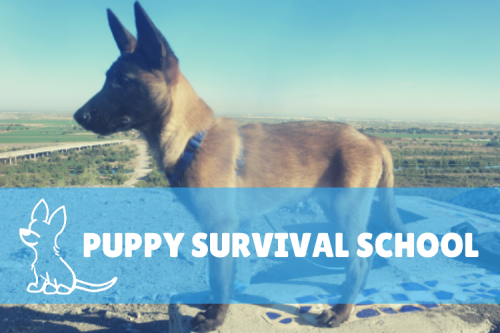What are you supposed to do when you just want to snuggle your fuzzy adorable wittle puppy, but they hate being touched and chomp on you every time you reach for them?
That was the question one of our Academy students, Kathryn, first came to us with.
Kathryn and her pup have made fantastic progress over the past few weeks, but things sure were rough in the beginning! We thought our answer to her initial question about her baby landshark would be relevant to a lot of folks’ interest, so we’re sharing it with you today.
Twice a month, we hold live Q&A sessions with our students. In the clip below, we’re chatting about this question that Kathryn posted in our forum:
The question
“I have a 15 week old rescue (Aussiedoodle mix) who is quite challenging. Very smart and trainable, very excitable (loves people and dogs almost too much). His first weeks were spent in a foster home with 2 small children who played very roughly with him (think running, screaming, hair pulling, biting … exactly the way puppies play). I know this because I saw them in action twice. The four year old told me twice that “he bites.”
Sure enough, he’s a land shark. We are working away at that (your lessons on biting have been helpful), but an extra twist is that if I try to touch him or pick him up without first offering a treat, he will bite my hands. I have been using his breakfast and lunch meals to pet him gently all over his body in exchange for a piece of food. This works very well when I have food. Once it’s gone, he is sensitive again about being touched.
[…] Any other suggestions regarding the handling? I was ready to rehome him Wednesday (not really, but in my mind I sure was). With no snuggling or cuddling for the 7 weeks we’ve had him, I feel pretty low. I am also experiencing the WTFWIT phase during this time. Your videos have been a life saver. Thanks!“
Our answer
Transcript of our answer
Jake: My first thought is that this puppy was in a household with children who were very rough with him. I think this puppy has just never had any say in whether he’s handled or not. That would make anyone insane, I think.
So give it time. Give him time to settle in. She’s had him for, I think, seven weeks now. Which feels like an absolute eternity with a new puppy, but it’s really not very long in the grand scheme of things.
You’re still in the thick of it. He still needs to build a relationship with you, still needs to settle in and learn that he’s safe.
What I would do is just go at his pace. Let him have some say in whether you pet him or not. And I know it’s hard not to pet little puppies, because that’s what they’re for, pretty much! But if you listen when he says “no, don’t do that,” that will go a long way toward making him more okay with being touched.
Erin: Yeah, I know it’s really hard to not cuddle him and you’re not getting any reward for the time you’re putting in. Usually, at the very least, owners get to pat them and do fun things with a puppy and I’m sure that as you’re watching him grow up, it feels like that time is disappearing and you’re never gonna get it back.
That, if you’re anything like me, is going to make you rush. And when we rush with puppies, it does way more damage than if we’re patient and we lose a couple weeks. If we rush, we’re gonna lose a few months.
The first thing I would say is, based on what you’ve described, I think what’s probably happening is that he’s learned, just like Jake said, that when he’s touched, he’s not gonna have any choice in what happens to him after that.
Biting in puppies is really often a frustration behavior. So I think it’s partly that he’s trying to get some distance by showing those “aggression” behaviors -and aggression is totally normal in every dog- but also it’s just frustration. He’s really frustrated and that has to come out in one way or another. In puppies, it tends to come out with their mouths.
I think a really good step would actually be teaching him a touch cue. So maybe use your hand as a target and teach him a touch cue. That’s gonna do a couple things. Firstly, it’s going to be really good mental exercise for him. At this stage, he’s very very smart and very young, his brain is like a spongev you’re going to be wanting some easy things to work on during your training anyways. Touch is a really good option.
Jake: There is a lesson on [hand touch] in the Baby Obedience course in Puppy Survival School.
Erin: The second thing is, touch is a really useful cue for later on down the line. So if he’s already showing some kind of sensitivity, whether that be to just being touched, or whether that be to anything else, especially being an aussiedoodle mix (they can be relatively reactive genetically) I think having a touch cue in your arsenal is going to make things a lot easier when this dog is a teenager or an adult.
So start now, build up a really positive association with that cue. The third thing that this is gonna do is teach him that he has a choice. What we’re trying to do is teach him that when hands come towards him or human hands are presented, that doesn’t automatically mean that he’s trapped. He has the option to come up to you – or run away if he wants to. If he comes up to you, he gets a really good treat.
So we’re building a positive association with human hands, which is something he hasn’t had. And to Jake’s point, the other thing is that this guy has been alive for 15 weeks! And for the last seven weeks of that life he’s been with you but for the first six weeks… I can’t do math… eight weeks?
Jake: For “the first half of his life.”
Erin: Yes. He’s been manhandled by tiny humans that have absolutely no concept of spatial awareness or autotomy or consent or any of that. So I know it feels like you’ve been at this for a a long time, but in his eyes, you’ve been at this for just as long as the other tiny humans had been at him in very different ways.
So, give it a little bit of extra time. Be patient with him. He’s learning. He’s a baby.
The other thing to think about, just as a quick aside, is yes, this could be a frustration behavior. But another thing that could be happening though (and when it comes to puppies, these things tend to like, mix in and get really confusing so it could be a bit of both) is you mentioned that these kids have played with him really roughly.
So yes, he could be feeling a little bit of fear and frustration about not having choice, but he could also be biting because that’s how puppies play and he’s been taught that he can play that way with humans. So when your hand comes toward him, you might be coming in for a nice calming pat, but he sees it as an opportunity for a game. He’s a puppy, he’s very smart, he’s got lots of energy, so he’s gonna engage.
So another thing that I would tell you to do is incorporate lots of toys into your play. So that we can start getting him excited about playing with something other than human skin.
To summarize for you, Kathryn:
1: Patience. He’s an itty bitty baby and this is representative of like half his life. So be super patient.
2: Self care for you. Because this is a time where you’re doing a lot of work and getting absolutely no reward from this puppy, which I totally get. That’s not his fault, but you have to give yourself reward from somewhere else. Please do some self care stuff for you, so that you can be in a really good place to have a good relationship with this pup.
3: Actionable step, teach a touch cue.
4: Incorporate lots and lots and lots of toys into your play, so you can start breaking that association of “I play with human hands,” and making it “I play with toys.”




